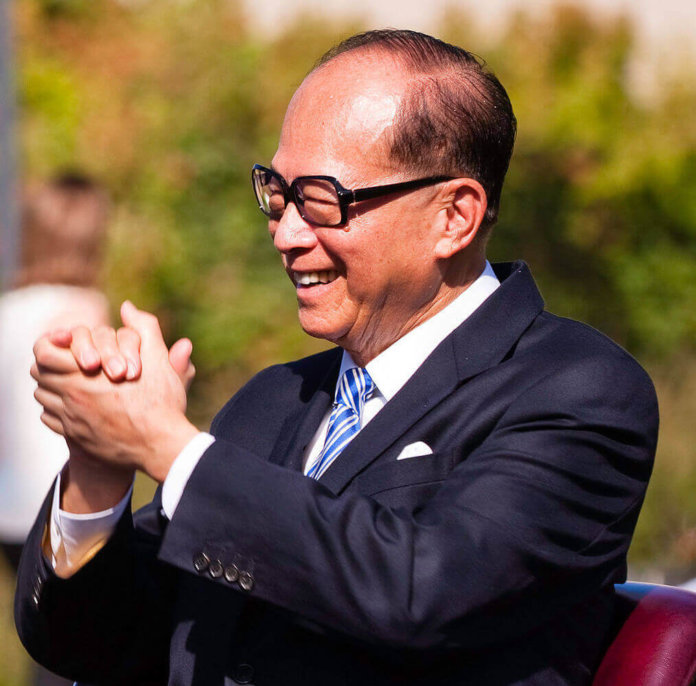
In many ways, Li Ka-shing is the antithesis of what we’ve come to expect from a modern billionaire. He’s quiet, soft-spoken, shuns the limelight, is conservative in his balanced approach to business and is quite possibly the most frugal man you will ever meet.
But don’t let the unassuming demeanour fool you. In the business world, he’s come to be known as ‘Superman’ for his seemingly superhuman business sense and capabilities.
As of the beginning of 2018, Li is believed to be the 23rd richest person in the world, with an estimated net worth of US$37.7 billion. His business empire is divided between two holding companies – CK Hutchison Holdings and Cheung Kong Holdings. In his lifetime, he has earned the title of Hong Kong’s wealthiest man. In 2000, he was named Asia’s Most Powerful Man by Asia week, and in 2006, he was honoured by Forbes Magazine with the Malcolm S. Forbes Lifetime Achievement Award.
And now, with the recent announcement of his retirement, it is fitting to look back upon his impressive career and extract lessons for those who seek to follow in his path. While there is no shortage of great advice that can be mined from his life and career, here are three key business lessons from the life of Li Ka-shing.
Lesson #1 – Do Your Homework
Li Ka-shing was sent to study in Hong Kong when he was a young boy. However, his father died when the boy was only 12, and a young Li Ka-shing had to enter the workforce to take care of his family. He often worked between 16 and 20 hours a day in a plastics factory. Over time, he got into sales and would go out selling belts, watchbands and other items.
All this time, he was taking a sort of master class in the plastics manufacturing business. In 1950, at the age of 22, Li Ka-shing cobbled together all the money he could get his hands on and started his own business.
“I only had some of my savings and some money I borrowed from relatives. I had about $6,500 to start my business,” he said in a recent interview with Bloomberg News.
To make his business successful, he knew it would take more than hard work and determination. It would require a constant effort in learning everything he could about the plastics industry. To this end, he went out on a fact-finding tour across Europe to learn about the latest colour-mixing techniques to create the most life-like plastic flowers. And, just as importantly, he never let up on his reading.
“Whatever industry I got into, I would buy books about that industry. So when I was manufacturing plastics, I read a well-known trade magazine from the U.S. called Modern Plastics. There was so much information in it, and a new copy was released each month.”
It wasn’t long before he saw this approach pay off.
“It got to the point where we had more orders than we could handle.”
Lesson #2 – Expansion Must Be Smart and Balanced
His dedication to learning everything he could about his industry led to significant growth in a relatively short period of time.
“My business had the fastest growth when I was around 27 to 30,” he said. “I was rich before I was 30 and had everything my family and I would need for the rest of our lives.”
Despite the rapid success, he knew better than to expand quickly for the sake of expansion. He preferred to take a cautious approach, so he could strike when the right opportunity presented itself.
“It’s my habit that I’m always careful with my cash flow. That means I have the extra capital to get into another industry whenever I want to.”
The opportunity that took Li Ka-shing’s business empire to the next level occurred in 1979. Its significance was recently alluded to in a New York Times article on the business giant.
“But it was his acquisition in 1979 of an old British trading house, Hutchison, that really elevated Mr. Li. He bought a controlling stake in the business from HSBC, which had bailed out the company as it struggled under large debt. It was the first time a Chinese person had taken over a British company, and it marked an important moment in Hong Kong’s changing power structures.”
He had waited a long time to make such a huge move. In doing so, it represented the fine balance he walks between complacency and over-aggressiveness.
“I always have this principle – in the development stage, don’t forget stability. When there’s stability, don’t forget development. Such a balance is very important.”
Lesson #3 – Never Forget The Importance of Humility and Frugality
One of Li Ka-shing’s most notable personal quirks is his now-famous frugality. Whereas most billionaire CEOs boast luxurious and expensive clothes, shoes, cars and watches, you’ll find none of those with Hong Kong’s richest man. Much has been made about his inexpensive watch although, for him, the explanation is simple.
“Suppose this (watch) costs $100,000, I need to be careful. But this is a few hundred dollars U.S., (so) I play golf, I can go swimming, I can get any exercise, and I don’t need to be careful.”
His frugality is more than just simple practicality; it speaks to the demeanour one should exhibit both when climbing the ladder and after achieving a certain level of success.
“Try to buy minimal clothes and shoes. Save your money and instead buy gifts for your loved ones and tell them your plans and your financial goals. Tell them why you are so thrifty. Tell them your efforts, direction and dreams.”
He believes practising frugality will do more than put forward a proper outside appearance; it will do wonders to create a sense of inner peace.
“When you are rich, don’t show off, but silently spend the money on yourself. You must not be seen as a spendthrift. Your life would have come full circle and reached its basics. There is tranquillity at this stage.”
In announcing his retirement, Li Ka-shing is handing the baton of his business empire to his son Victor, but he’s not expecting any major disruptions in the business operations.
“I have two holding companies. Victor has managed them 100 per cent for the past few decades,” he said. “We have a great team, and we all work together.”
There is little doubt Victor picked up an informal master’s degree in business. He learned at the feet of one of the most successful entrepreneurs of all time.









